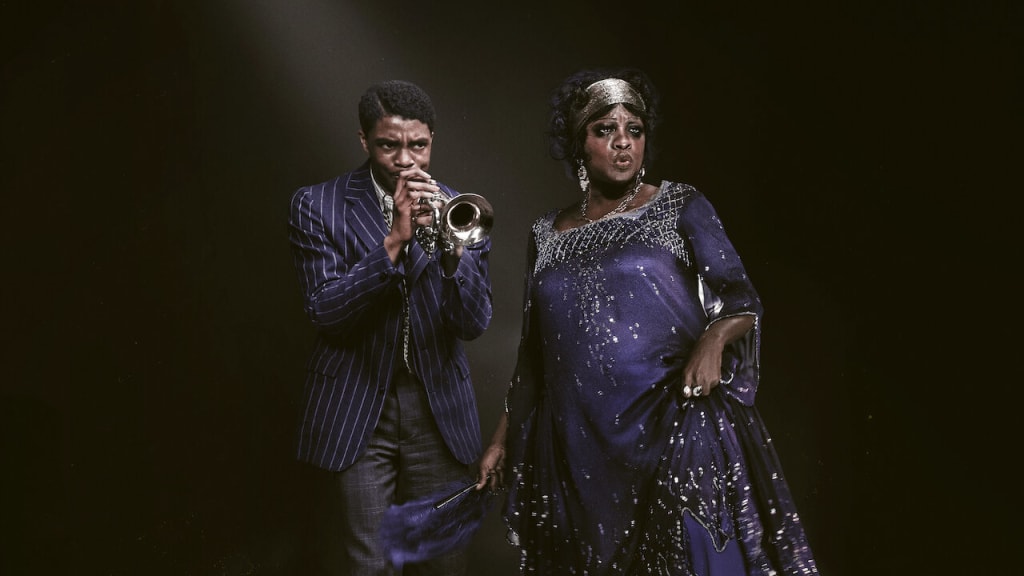Ma Rainey's Black Bottom - review (Netflix)
I watch it so as you may not have to.

Brief synopsis: successful blues singer, Ma Rainey (Viola Davis), heads north to Chicago to meet up with her band to make a recording of some of her songs. One of her band, Levee (Chadwick Boseman) causes a rift with his ambition and passion.
Is it any good?: Ma Rainey’s Black Bottom is a little too stagey and more of a collection of monologues than a coherent story or film. From a play written by August Wilson, the screenplay by Ruben Santiago-Hudson does nothing to disguise the stage play roots.
With good performances from. Everybody on show and standout performances from Davis and Boseman in his final film, Ma Rainey’s Black Bottom is a watchable film but not a must watch film.
Spoiler territory: in a tent, down south in America, 1927, black people come from all around to see blues singer Ma Rainey perform. The tent is packed out and Ma Rainey is performing to great acclaim in front of an appreciative crowd.
With emancipation having happened in the north, black people had begun to migrate in numbers in search of work and a new life. Ma Rainey’s reputation and fame continued to grow down south, her and the band playing in bigger venues.
At one of the shows, her trumpeter, Levee, steps into the spotlight, add-libbing a solo. A little while later, the band arrive in Chicago. They are there for a recordIng session at Sturdyvant’s (Jonny Coyne) Hot Rhythm studio.
Ma’s manager, Irving (Jeremy Shamos), is at the studio preparing for their arrival. Sturdyvant is not especially happy about the upcoming arrival of Ma. He finds her difficult.
Three of the band arrive. Cutler (Coleman Domingo), Toledo (Glynn Turman) and Slow Drag (Michael Potts) and are greeted by Irving. He wants to know where Ma is. She has not arrived yet.
Levee is not there either. On the streets of Illinois, Levee is admiring a pair of shoes. The band settle into the studio and get ready to rehearse.
Levee arrives. He bought the shoes and makes a show of putting them on. It is hot in Chicago. Levee goes to open a door but finds it locked. He does not remember it being locked the last time he was there and remarks on how everything has changed.
Toledo tells him things always change. Levee, a young abrasive trumpet player, starts to tell the rest of the band that he is going to have his own band.
Cutler, who is the de facto leader of the band, tells him that they are an accompaniment band. They play Ma’s music, how she wants it. Levee tells them he has a new, more upbeat arrangement for one of her songs. Cutler says they cannot do his arrangement. Irving comes into the room.
He is looking for Ma. Cutler tells him she has not arrived yet. He asks about the arrangement. Irving tells him they are going with Levee’s arrangement.
In town, Ma is seeing a different kind of black people to the ones she is used to down south. She walks around a tea house with her nephew, Sylvester (Dusan Brown) and niece, Dussie Mae (Taylour Paige). The black people watch Ma and her charges as though they were curiosities. Ma returns to her car.
Back in the studio space, the band are ribbing Toledo about his old shoes. Levee starts dancing. Toledo cautions them against only looking for fun as black people suffer the world over. They start talking religion. Levee insists that he has no time for God.
Outside the studio, Ma as arrived but Sylvester has had an accident with another car. Irving comes out of the studio to find Ma arguing with a policeman. Irving nervously intervenes and smooths things over. Inside the studio, an irritable Ma has Irving scurrying around for a fan.
Dussie, an attractive girl, uses her looks to curry favour with her aunt and asks for new shoes. Ma tells her she will get her some new things. She tells Sylvester he will get some things to.
He is also going to do a bit on the recording. Music is playing; Levee’s version of Ma’s Black Bottom. Ma asks Irving about it. He tells her that people want to hear a more upbeat sound. Ma is not changing her arrangement. She will sing the song how she originally wrote it.
She tells Irving to take Sylvester to meet the band and tell them that he is doing the intro to the recording. She decides to go and introduce him herself. She also tells Cutler that they are doing the song to her arrangement with Sylvester doing the intro. Levee tries to protest but Ma is having none of it.
Ma leaves and a frustrated Levee voices his frustrations. Cutler tells Sylvester the opening he needs to say and asks him to repeat it back to him. Sylvester begins to speak and the band realises he has a stutter. Levee laughs, asking how Cutler plans to sort out the intro. Sturdyvant comes down to the studio.
Levee approaches him with some of his songs. Sturdyvant takes the songs and leaves. The rest of the band laugh at Levee’s subservient attitude towards Sturdyvant.
Levee takes offence and tells them he acts how he needs to around white people to get what he needs. He tells them that he learned how to do so from his father who he had seen smile in the faces of the men who sexually assaulted his mother and then return at a later date to try and exact revenge on them.
Cutler tells Irving that Sylvester cannot do the part. As the band rehearse, Ma sees Levee eyeing Dussie. She tells Cutler to warn him. They get ready to record and Ma wants Sylvester to do his part first.
Irving tells her he cannot do it. Ma insists on him getting a microphone and doing the part. Sturdyvant tries to complain about the cost and she reminds him that she makes more money for him than all his other acts put together.
There is another hiccup. Irving did not get any Coke. Ma stops the session and sends Slow Drag and Sylvester out to get some. Ma speaks to Cutler, unhappy about having to fight to get Sylvester on the record as she obviously knows the boy has a stutter. Dussie goes to find Levee and flirts with him.
Ma explains to Cutler that she understands that the only reason Sturdyvant or any white people put up with her, is because of her voice and she makes them money.
That includes her manager Irving. Levee continues to charm Dussie, telling her he is going to form his own band. The two get frisky. Ma and Cutler speak about the blues and the meaning of the music to black people.
Slow Drag and Sylvester return with the Cokes. Levee and Dussie’s union is interrupted as he needs to return to the recording. Sylvester, unsurprisingly, struggles to get the intro out.
He nails it after multiple takes and the band strike up, Ma singing the song perfectly in one take. Unfortunately, Sylvester’s microphone’s wire is frayed and they did not get the recording.
A frustrated Ma leaves the studio. She is going home. Irving begs her to stay. He will sort everything out in fifteen minutes. Ma stays. The band takes a break. Cutler tells Levee he needs to leave Dussie alone. Levee lies, saying he only ever asked her her name. Toledo tells him that he understands how he could become foolish over a woman.
Cutler tells Levee that his roving eye is going to get him fired. Levee argues with the rest of the band about their acceptance of their lot in life and how he plans to be respected by white people. Cutler tells the group about a black reverend who had been forced to dance at gunpoint and ridiculed for his belief in God.
Levee challenges Cutler, asking where was God when that man needed help. He tells Cutler that God hates black people. Cutler punches him and the two scuffle.
The other band members separate them. Levee pulls a knife and goes for Cutler. Cutler manages to avoid getting stabbed. An angry Levee asks God where he was when his mother was calling out for his help.
They return to the recording room. They record the track perfectly. Ma asks Levee why he felt the need to embellish. He tells her he likes to add his own flavour. It quickly escalates to an argument and Ma fires him.
An angry Levee leaves the recording room, returning to the rehearsal room. Upstairs, Irving tells Ma that Sturdyvant does not want to pay Sylvester. She tells him to get the boy’s pay. Sturdyvant quickly comes around to Ma’s way of thinking and pays Sylvester.
He needs Ma to sign the music release forms. Ma leaves, Irving chasing after her asking her to sign the forms. She tells him to send them to her home. She warns Irving that she will record elsewhere in future if there are any more hiccups.
The band get ready to leave and Sturdyvant pays them. Levee speaks to Sturdyvant, asking if he can get a recording session. Sturdyvant tells him he will buy the songs but does not want to record them. They do not sound right. Levee’s argument to convince him otherwise falls on deaf ears.
A despondent Levee returns to the rehearsal room. Toledo accidentally steps on his new shoes. He apologises. Levee is riled up and wants a more fulsome explanation for the transgression. Toledo dismisses him, packing up his things and turning to leave. Levee stabs him in the back, killing him.
Ma is being driven home, unaware of what has happened back at the studio. Levee cradles the dead Toledo. An all-white band record a version of Black Bottom. The End.
Final thoughts: Ma Rainey’s Black Bottom is most notable for being Chadwick Boseman’s final film. Directed by George C Wolfe, it does flow nicely and looks great.
Regrettably, as a Boseman’s last film, it is not a masterwork. Boseman is excellent in it and, if anything, it is almost sadder to see that his obvious talent was extinguished so prematurely.
Viola Davis matches Boseman with a captivating performance as the bigger than life Ma Rainey. Such is the power of her performance it will have you looking into the real-life Rainey.
As I alluded to earlier, the film is too obviously based on a stage play, the screenplay putting the monologue style of stage work to the fore.
The story is centred around the recording studio but seems a little truncated, the whole story not told. Though the original August Wilson play was written in 1984, it is set in the twenties and, as such, reflects the black sensibilities of that time.
The outlook is quite bleak and needy, with even the successful Rainey knowing that her acceptance is only because of her voice.
The appropriation of black music by whites is not new and still happens to this day and is the underlying theme of the film. There is also a veiled dig at the blind faith shown in a Christian god that has never favoured black people.
At ninety-four minutes long, Ma Rainey’s Black Bottom is not a long film and whizzes through its runtime fairly quickly but suffers a little from having too much story to tell in its runtime. As I wrote earlier, the film is not bad but it is not great either.
Is it worth watching? For the performances of not just Boseman and Davis, but the whole cast, yes. As an enjoyable ninety-minute-plus film it is not a must-see.
About the Creator
Q-ell Betton
I write stuff. A lot.






Comments
There are no comments for this story
Be the first to respond and start the conversation.